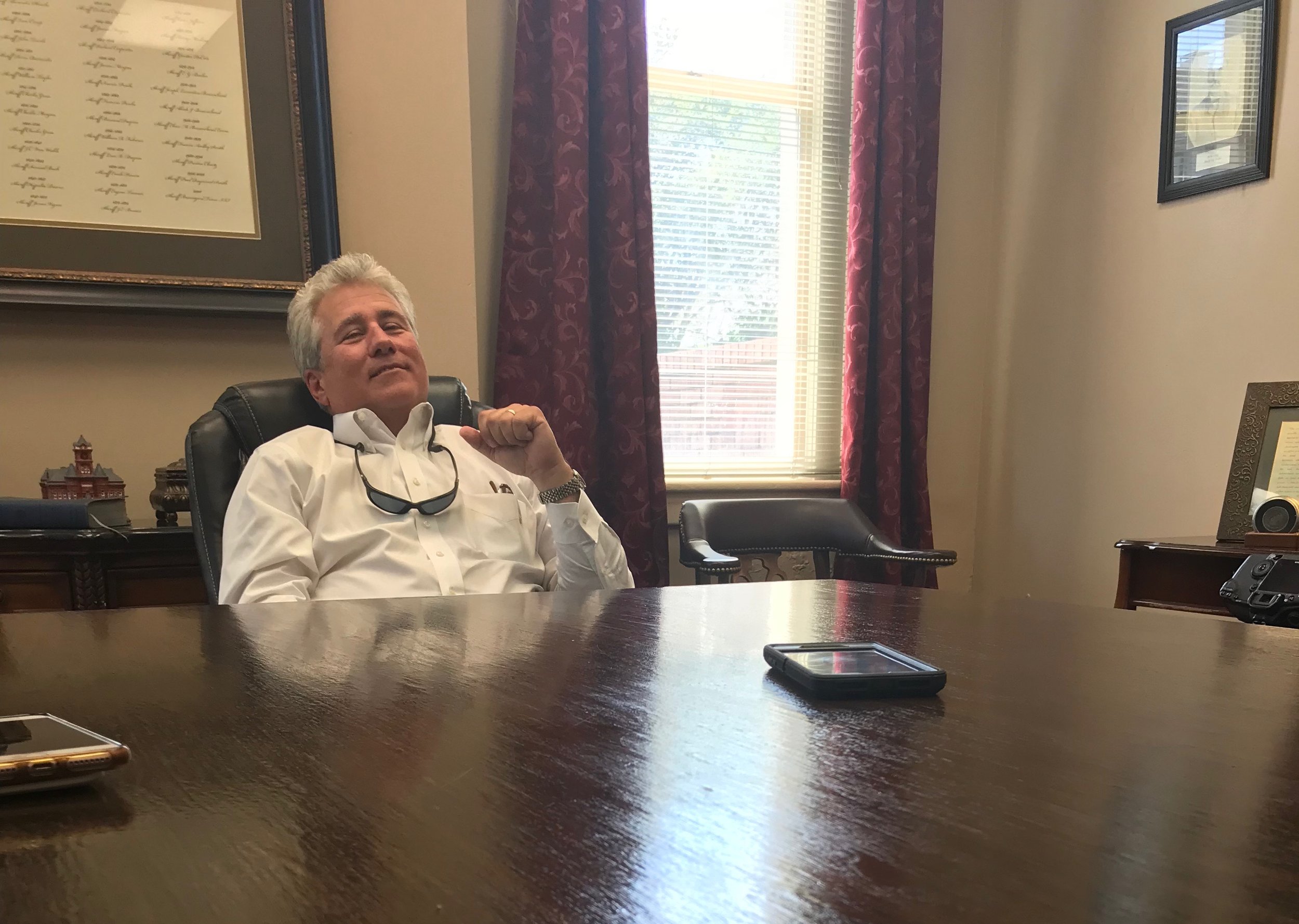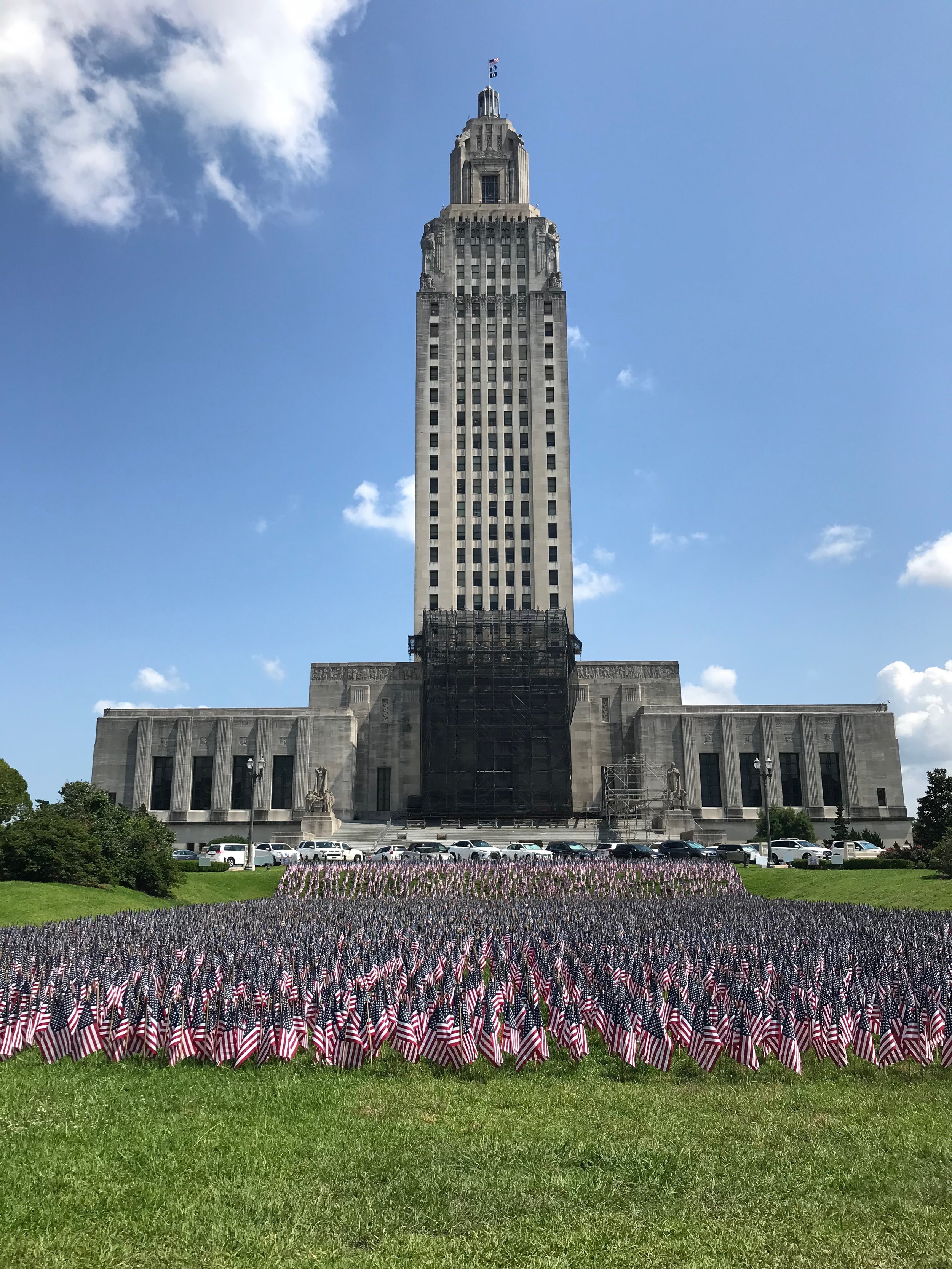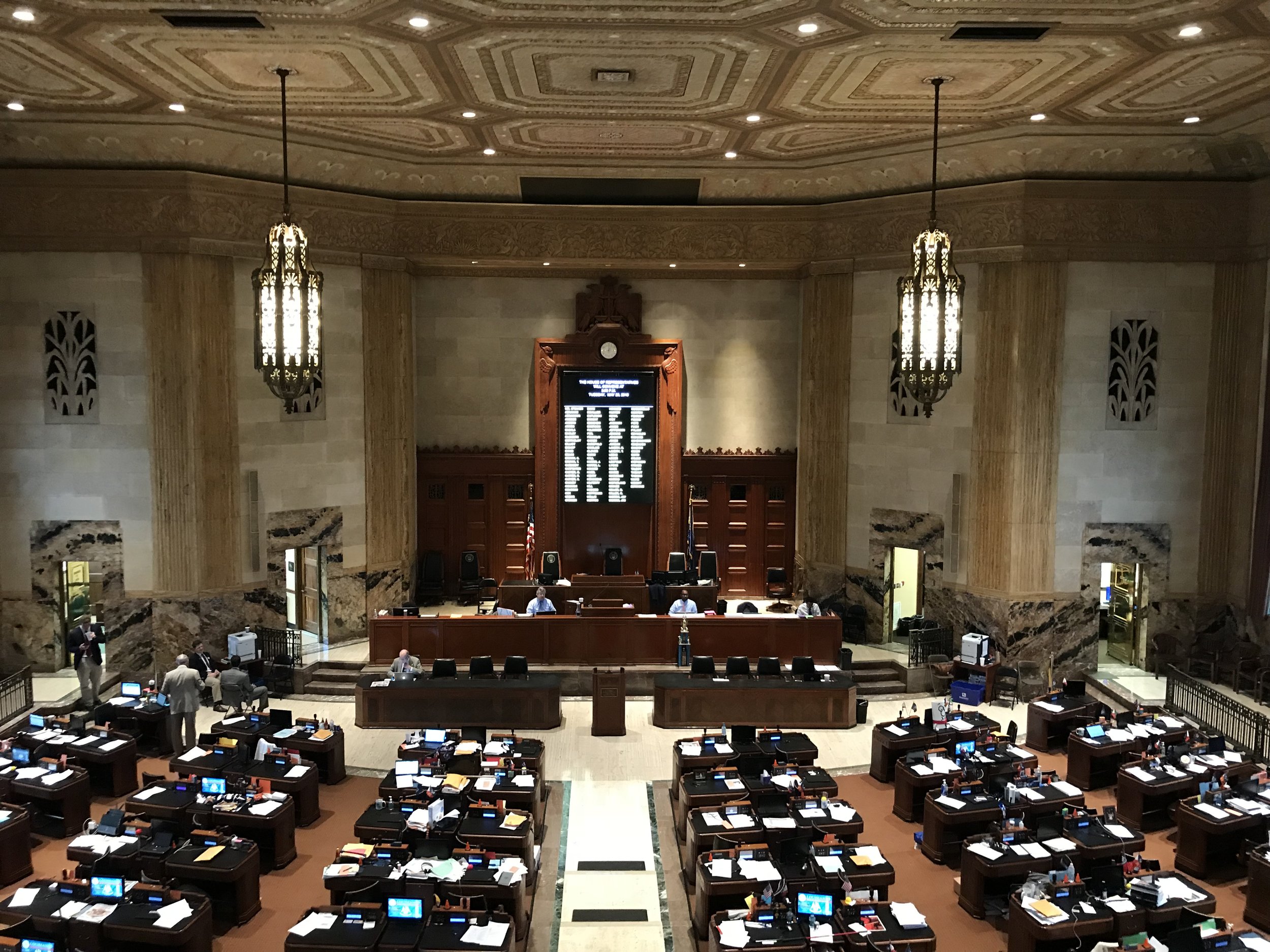“We pledged allegiance to the flag. The flag hung limp from a ten-foot bamboo pole in the corner of the white picket fence that surrounded the church ”
Here we are in the old Pointe Coupee Parish courthouse prison cells: 12 college students and one professor, exploring a place that is far from our home. It is nearly 90 degrees Fahrenheit outside and there’s no air conditioning to cool the hot floor of the building; it seems unimaginable to have to be on this floor for more than a single hour, let alone stuffed into one of the tiny prison cells.
There they were, some 75 years ago or so, in a courthouse in the fictitious town of Bayonne that bears striking resemblance to Pointe Coupee today: 12 white members of the jury and one white judge held the fate of black man in their hands at the Bayonne courthouse in Ernest J. Gaines’ novel, A Lesson Before Dying. Jefferson, a black man, is wrongfully accused of a crime he did not commit and is sentenced to be executed by electric chair, a grave injustice. Jefferson is dehumanized by the segregated criminal justice system and is forced to live out the rest of his life until the day he dies in a hot, stuffy and tiny prison cell.
Today, boxes of unorganized papers and old books fill the cells in the Pointe Coupee Parish courthouse prison cells which once barred inmates until as early as the late 1980s. The cells-turned-storage rooms still hold on to the memories of humans found guilty of crimes; they are rooted in the agony and despair of their former inhabitants. The highest floor of this building paints the story of life in a cell that Gaines writes about in his novel for us to see with our own eyes. Rundown toilets are relics of the days when men and women lived day after day in these cells. Gaines describes the prison cell that Jefferson is placed into in A Lesson Before Dying:
“The cell was roughly six by ten, with a metal bunk covered by a thin mattress and a woolen army blanket; a toilet without seat or toilet paper… ”
In the months leading up to his execution, Jefferson is visited by his Aunt Lou and local school teacher Grant Wiggins who is charged with the task of teaching Jefferson how to become a man before his death sentence. In his godmother’s eyes, Jefferson must be rooted in his manhood before he can meet his maker, so Grant Wiggins is Miss Emma's choice for the man who will teach her godson how to become a man.
At first, Grant Wiggins is hesitant to visit Jefferson in prison, but after visiting Jefferson multiple times, Grant begins to become closer to Jefferson in the days leading up to the execution. As Dr. Gaines puts it himself, while Grant is teaching Jefferson how to die, Jefferson is teaching Grant how to live. Grant left Bayonne for California to go to college before coming back to teach in Bayonne, something in his past, his roots, made it impossible for him to stay away, as Grant comments:
“My mother and father also told me that if I was not happy in Louisiana, I should come to California. After visiting them the summer following my junior year at the university, I came back, which please my aunt. But I had been running in place ever since, unable to accept what used to be my life, unable to leave it ”
When Grant Wiggins comes back to where his roots are, he must grow them as he spends time with Jefferson in prison or teaches the local schoolchildren about their place in the world. Although he is unable to comprehend why he cannot leave his childhood home, maybe it is because when he goes back to it he finds the same community in the same despair.
Local church/school from Dr. Gaines' childhood that now sits on his residential property.
Yet the black community of Bayonne comes together, especially in the months leading up to Jefferson’s execution; they are rooted in belief and camaraderie, the sons and daughters, grandchildren and great-grandchildren of former enslaved people, coming together to lift each other up. Members of the community help Grant gather enough money so that he can buy a radio for Jefferson. Grant Wiggins gathers the school-aged children in the local church and teaches them about reading and arithmetic as well as providing them with life lessons, disciplining them when necessary, and reminding them that the justice system rooted in the United States of America is flawed and unfair:
“Do you all know what is going on in Bayonne?... Do you all know what is going to happen to someone just like you who sat right where you’re sitting only a few years ago? All right, I’ll tell you. They’re going to kill him in Bayonne. They’re going to sit him in a chair, they’re going to tie him down with straps, they’re going to connect wires to his head, to his wrists, to his legs, and they’re going to shoot electricity through the wires into his body until he’s dead.”
I interned at the courthouse where The State of Colorado v. James Holmes was on trial when I was a senior in high school. The District Attorneys tried hard to convince the jury that James Holmes, who walked into a movie theater in Aurora, Colorado during the midnight premiere of The Dark Knight Rises, the white man who brutally killed 12 victims and injured 70 more, was guilty of his crimes. I sat and spoke with one of the victims’ mother, unable to imagine the pain that she felt losing her own child. I listened to witness testimonies recounting the tragic night. I watched as James Holmes who had dyed his hair bright orange, spun around in his seat as the DA was presenting evidence against the murderer to the jury.
The 12-person jury was all white except for one Hispanic woman. James Holmes, a white man and a mass murderer, was found not guilty of his heinous crimes due to insanity. He was sentenced to life in prison even though he had taken the lives of 12 innocent people. The justice system still puzzles and fascinates me to this day.
***
Our class walks around the prison cells; we have a type of freedom that the inmates who once were confined to these cells never had. We walk through the prison cells in solemnness, dwelling on the plight of the numerous inmates who were once confined to these claustrophobic and stuffy cells. In one cell, our guide, Tammy, points out a rectangle in the ground where the floor has been welded back together. She then looks to the ceiling and tells us that she believes the round circle is where unfortunate souls would be hung from, their bodies dropping down through the area where the floor was welded back together.
Throughout our time taking a tour of the prison cells I wondered about justice and the meaning of such a concept. Perhaps, like Jefferson, many men and women were wrongfully accused of crimes they did not commit and were sentenced merely for the color of their skin: an injustice. For those who were rightfully accused, what was their punishment? Was it just? Was it execution by electric chair like it was for Jefferson? How could the United States of America, a country that prides itself in its roots of freedom and opportunity, be responsible for a quarter of the world’s prison population? Is that justice? Is that freedom? Is that really how this country treats its citizens?
We were not even in those prison cells for one hour, let alone a day, let alone a week, a month, a year, multiple years, but I was hot, claustrophobic and felt like I was carrying the weight of the world. I could never imagine being confined in these cells. The place feels so haunted and so horrifying. I was relieved when we hastily went down the stairs to the air conditioned first floor, fresh air never smelled so wonderful.
Our class got to meet with the current sheriff of Pointe Coupee, Sheriff Beauregard “Bud” Torres III, who not only is approachable but can also hold a tune; he leads a double life as the "Singing Sheriff" and has recorded his originals songs in New York and Nashville. The singing sheriff plays his original songs for us: he is proud of his work in the same way that he is proud of his heritage. Sheriff Torres graciously sat down with us to talk about Louisiana in general and to tell us about his own family history.
Sheriff Torres can trace his roots back to the original French and Spanish who first came to Louisiana, including famous and integral ancestors who helped shaped this region of the United States. Similarly, I can trace my maternal grandmother’s lineage back as far back as before Christ and am the direct descendant of some integral people to world history including the notorious Christopher Columbus, who, in a way, helped to establish this country. I wouldn't say my roots are perfect, but I would like to think Columbus' descendants have come a long way and have learned from the past in order to try and make the world a better place to live in.
The room that we’re all in right now is the courthouse’s press room. Sheriff Torres tells us that, while he’s usually stressed in this room, sharing his songs and family history with us is extremely refreshing. We smile back at him from our spots on plush, comfortable spinning chairs, clouds compared to the hard beds the inmates would have had to sit on in the cells above us. The experience is humbling—all of us in that room are grateful that we only had to walk through the cells, places where distraught inmates once lived, rather than exist in those tiny spaces day after day.
***
The day before we went to the Point Coupee Parish, we were at the state capitol building in Baton Rouge. Within two days we walked through the Louisiana state capitol building one day—through the meeting places of the House of Representatives and the Senate and even saw the area where former and notorious Louisiana state governor Huey Long was shot in, only to walk through prison cells in Pointe Coupee the next day. We were able to walk around the building where matters pertaining to Louisiana are discussed and debated and saw the place one could be sentenced to should they break those laws within those two days. Both buildings have state legislative roots in their own ways and serve as reminders of some version of the making and repercussion of our country's justice system, which is clearly not perfect or fair, nor has it been for so many years before.
Ernest Gaines explores justice and the meaning of justice through Grant Wiggins' realization that the legal system is imperfect:
“...Don’t tell me to believe that God can bless this country and that men are judged by their peers. Who among his peers judged him? Was I there? Was the minister there? Was Harry Williams there? Was Farrell Jarreau? Was my aunt? Was Vivian? No, his peers did not judge him...”
Everything is rooted in something, anchored down in success in the same way it could be anchored down in sin. Roots are important, where you come from is important, but where you’re going, how you treat people and what you do to better the world, is far more valuable.










